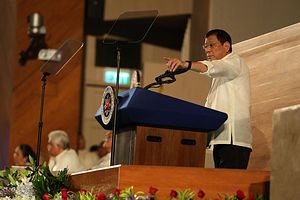While Philippine President Rodrigo Duterte ran late for his fourth State of the Nation Address in Manila Monday night, wheeling and dealing for the next speaker of the House seemed to lead to a fairly amicable power-sharing arrangement for now and brought a temporary end to weeks of speculation. But that was the only surprise of the evening, with Duterte playing his old classics as he gears up for the second half of his term.
Duterte’s crusade against drugs and those who use them is a familiar trope of his public comments, but he used this opportunity to refocus on another favorite crime talking point that had been sidelined during the election season. Resurrecting the death penalty, suspended in 2006, has been floated by Duterte and other government lawmakers in the past. He called on Congress to reinstate capital punishment for drug crimes and plunder — although only one of four bills currently in front of the Senate covers plunder.
Like most of the region, which is moving away from capital punishment sentences, the death penalty is a divisive issue in the Philippines. Some senators have already voiced their opposition to a potential reinstatement, noting the pro-life stance of the Catholic church and arguing that there is little evidence of a deterrent effect. The move has already drawn the condemnation of legal and human rights groups both at home and abroad.
Duterte also provided little in the way of unifying commentary on the recently re-inflamed South China Sea question. “When Xi says I will fish, who can prevent him?” he said during a rambling tirade justifying his heavily criticized inaction. The resigned take is at odds with Duterte’s machismo and is one of his few weak points.
Polling following the Recto (Reed) Bank incident shows a growing majority of Filipinos want stronger action in the South China Sea. With Duterte ineligible to run in 2022 (the Philippine presidency only has one six-year term under the current constitution), the dispute is one of few areas in which opposition lawmakers have room to maneuver. With a crowded field of possible successors vying for Duterte’s endorsement in the near future, the South China Sea should be expected to become more central to domestic politicking.
The reopening of tourist island Boracay after a six-month rehabilitation period last year should have been a highlight for the president. He promised the clean-up of the island is just the beginning, with other well-loved and worn-out tourist spots across the country to be targeted for similar programs. “There are those who violate environmental rules, I am giving due notice,” he warned tour operators.
Still, Duterte couldn’t resist his seemingly pathological urge to insert bizarre sexualized commentary into the most formal of occasions. “And the girls there, the foreigners are waiting for you gentlemen to visit the place. They are all on the beach sunbathing,” he said during the address, a line unlikely to be adopted by the Department of Tourism.
What’s particularly galling about this throwaway comment is that it comes less than a week after he signed the Safe Streets and Public Spaces Act into law. The law imposes harsher penalties on sexual harassment and gender-based discrimination. The obvious irony of Duterte signing in the law was widely reflected on at the time.
With a tightly controlled Congress, he’s unlikely to see any formal reprimand of consequence. Keen to avoid a repeat of the scandalous House coup that overshadowed his address last year and left former president and ally Gloria Macapagal Arroyo at the helm, Duterte has been intimately involved in the process. Son and former vice mayor of Davao City turned first term Congressman Paolo Duterte had been repeatedly floated as a possible candidate in the weeks leading up to vote, but eventually was one of three nominating Alan Peter Cayetano for the post. Cayetano ran unsuccessfully as Duterte’s vice president pick in 2016 and then served as foreign secretary from 2017 to 2018 before winning election to the House in May 2019.
Cayetano’s huge win — with 266 of 297 members voting in favor of his leadership — is a product of a power-sharing deal brokered between him and allies Lord Allan Jay Velasco and Martin Romualdez. Duterte ally Romualdez had shopped around for support for his bid, but appears to have settled for House majority leader and a Duterte endorsement for a vice presidential run in 2022. Velasco, on the other hand, is satisfied with a term-share deal between himself and Cayetano, which will see the pair split the three-year speaker term.
Following the Duterte camp’s hugely successful midterm election, it’s unlikely the term ahead will have any surprises. Cayetano called the House a “partner” to the Duterte administration, adding that under his leadership it will continue the fight against drugs, crime and corruption. With the expected election of Paolo Duterte as his deputy in the coming days, the pair have mended a high-profile rift and solidified the president’s power bloc.
































